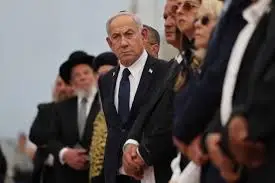‘War can end tomorrow if Hamas surrenders arms’: Netanyahu amid sanctions threat by UK, France, Canada

Israeli Prime Minister Benjamin Netanyahu recently declared that the ongoing conflict with Hamas could end immediately if the militant group surrenders its weapons. He said Hamas must also release all hostages and allow Gaza to be demilitarized. Netanyahu stressed that Israel will keep fighting until these demands are met, aiming for a “total victory” over Hamas.
This statement came as the United Kingdom, France, and Canada issued a joint warning to Israel. They condemned the intensifying military offensive and the blockade blocking humanitarian aid to Gaza. These countries threatened sanctions if Israel continues its attack without easing restrictions and allowing aid into Gaza.
Netanyahu’s Firm Stance: No Peace Without Hamas Disarmament
Netanyahu’s remarks show Israel’s determination to dismantle Hamas’s military power. He described the current campaign as a fight for Israel’s very survival. “For years, Hamas has used Gaza to attack Israel. We will not allow that to continue,” he said. “If Hamas surrenders and releases the hostages, the war can end tomorrow. Until then, Israel will defend its people.”
Israel’s government sees this operation as more than a tactical strike. It aims to permanently remove Hamas’s ability to threaten Israeli civilians. Netanyahu’s tough position leaves little room for negotiation until Hamas disarms.
Western Nations Push Back Over Humanitarian Crisis
The strong stance from Netanyahu met sharp criticism from Western countries. The UK, France, and Canada expressed deep concern over the worsening humanitarian crisis in Gaza. They urged Israel to stop actions that block aid and endanger civilians. Their joint statement warned of possible sanctions if Israel continues its current course.
“The civilian population is suffering greatly,” the statement said. “It is urgent that humanitarian aid reaches those in need. We call on Israel to allow full access immediately.”
These countries also stressed their support for a peaceful two-state solution. They want hostages released and violence to stop.
The Hostage Crisis Adds Urgency
One key issue Netanyahu highlighted is the release of hostages taken by Hamas. Israel says dozens of civilians and soldiers were kidnapped during recent attacks. The government sees their safe return as a crucial condition for any peace deal.
The hostage situation has added emotional pressure to the conflict. Families of the captives are pleading for their release. Israel’s military campaign aims partly to force Hamas to free the hostages.
Deep Diplomatic Divide Over Path to Peace
The differences between Netanyahu and Western leaders highlight a deep diplomatic divide. Israel demands total disarmament of Hamas before any ceasefire. Western nations favor negotiations that include security guarantees for both Israelis and Palestinians.
Human rights groups have raised alarms about civilian casualties and called for protection of non-combatants. The United Nations urges all sides to respect humanitarian law and prioritize civilians’ safety.
Netanyahu Criticizes Western Governments
Netanyahu harshly criticized the UK, France, and Canada’s stance. He accused them of rewarding Hamas and weakening Israel’s security efforts. Netanyahu urged European leaders to follow the example of former U.S. President Donald Trump, who supported Israel strongly.
“We need leaders who understand the threat Hamas poses,” Netanyahu said. “They must support Israel’s right to defend itself.”
The Human Cost of Ongoing Fighting
The fighting continues to devastate Gaza’s civilian population. Hospitals struggle to treat the injured. Supplies of food, water, and medicine are dangerously low. Thousands of homes have been destroyed, and many families are displaced.
The blockade blocking essential goods worsens the crisis. International groups call for safe corridors to allow aid workers to reach Gaza. Israel insists on controlling aid deliveries tightly to prevent weapons from reaching militants.
Worldwide protests and diplomatic efforts seek to stop the violence. However, the situation remains fragile.
What Lies Ahead?
The conflict’s future depends on whether Hamas agrees to Israel’s demands or if new diplomatic efforts emerge. Netanyahu insists on military victory to guarantee Israel’s security. Western nations continue pushing for ceasefires and political talks.
The sanctions threat adds pressure on Israel but also risks widening diplomatic rifts. Whether this tension leads to talks or further conflict remains unclear.
Resolving this crisis will require addressing deep political, security, and humanitarian issues. These challenges have persisted for decades and will not be solved easily.






